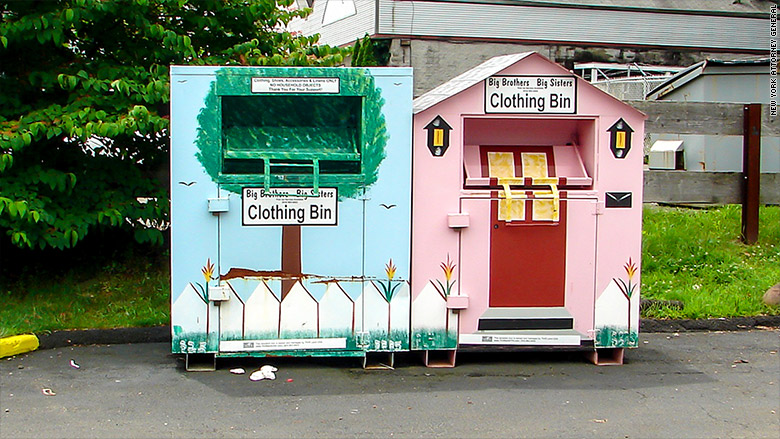Nazaroo
New member
Thats right: A commercial store chain set up thousands of fake charity donation boxes,
and collected clothing from people who thought they were donating to charities for homeless.
The corrupt prosecutor pretends he's making his rich friends "pay" with minimal fines
that don't even make an impact on the $10 million they ripped off from US citizens.
This phoney Attorney General ought to be put in jail himself.
and collected clothing from people who thought they were donating to charities for homeless.
The corrupt prosecutor pretends he's making his rich friends "pay" with minimal fines
that don't even make an impact on the $10 million they ripped off from US citizens.
Thrift store caught making millions off donated clothes By Aaron Smith @AaronSmithCNN 
If you've been dumping your used clothes into big metal bins thinking they're going to charity, think again. New York prosecutors forced a for-profit company to cough up a $700,000 settlement for scamming people into thinking their donated clothes were benefiting the needy. Instead, Thrift Land USA of Yonkers sold the clothes and lined its pockets with at least $10 million, according to New York Attorney General Eric Schneiderman The A.G. says the company planted more than 1,300 clothing bins throughout New York and Connecticut and plastered them with logos for the non-profits I Love Our Youth and Big Brothers Big Sisters of Rockland County. The company made a "huge profit," but only paid fees ranging from $100 to $200 to the non-profits to use their logo, according to the AG. "Duping members of the public into thinking that they are making a charitable donation, when in fact they are enriching a for-profit corporation, is both deceptive and illegal," said Attorney General Schneiderman, in a prepared statement. "When a for-profit company masquerades as a charity, my office will hold it and its owners accountable." A lawyer representing Thrift Land USA of Yonkers, and its owner Carl Vella, refused to comment to CNNMoney. The A.G. also found fault with the non-profits. The A.G. said that I Love Our Youth continued to operate as a charity even though its state registration and federal tax exempt status had been revoked and its chairman, Hosea James Givan II, used charitable funds to pay personal expenses. Givan had to pay $50,000 in penalties and agreed to shut down his organization. But Givan told CNNMoney that his problem was primarily a lack of record keeping, rather than bad intent. "As an organization we were negligent in not documenting every receipt, but it didn't mean that we were doing anything illegal or unethical," said Givan. "Honestly, man, we were victims too in this situation. We didn't make any money. No one in our organization was living lavishly from this. I'm in debt. I'm fairly highly regarded in my circles, and this is embarrassing for me." The settlement paid by Thrift Land includes $50,000 in penalties and a payment of $650,000 to two non-profits, the New York Community Trust and the Westchester Community Foundation. The A.G. said this is "so that the charitable intent of the people who placed clothing in its bins will be fulfilled." |
This phoney Attorney General ought to be put in jail himself.
